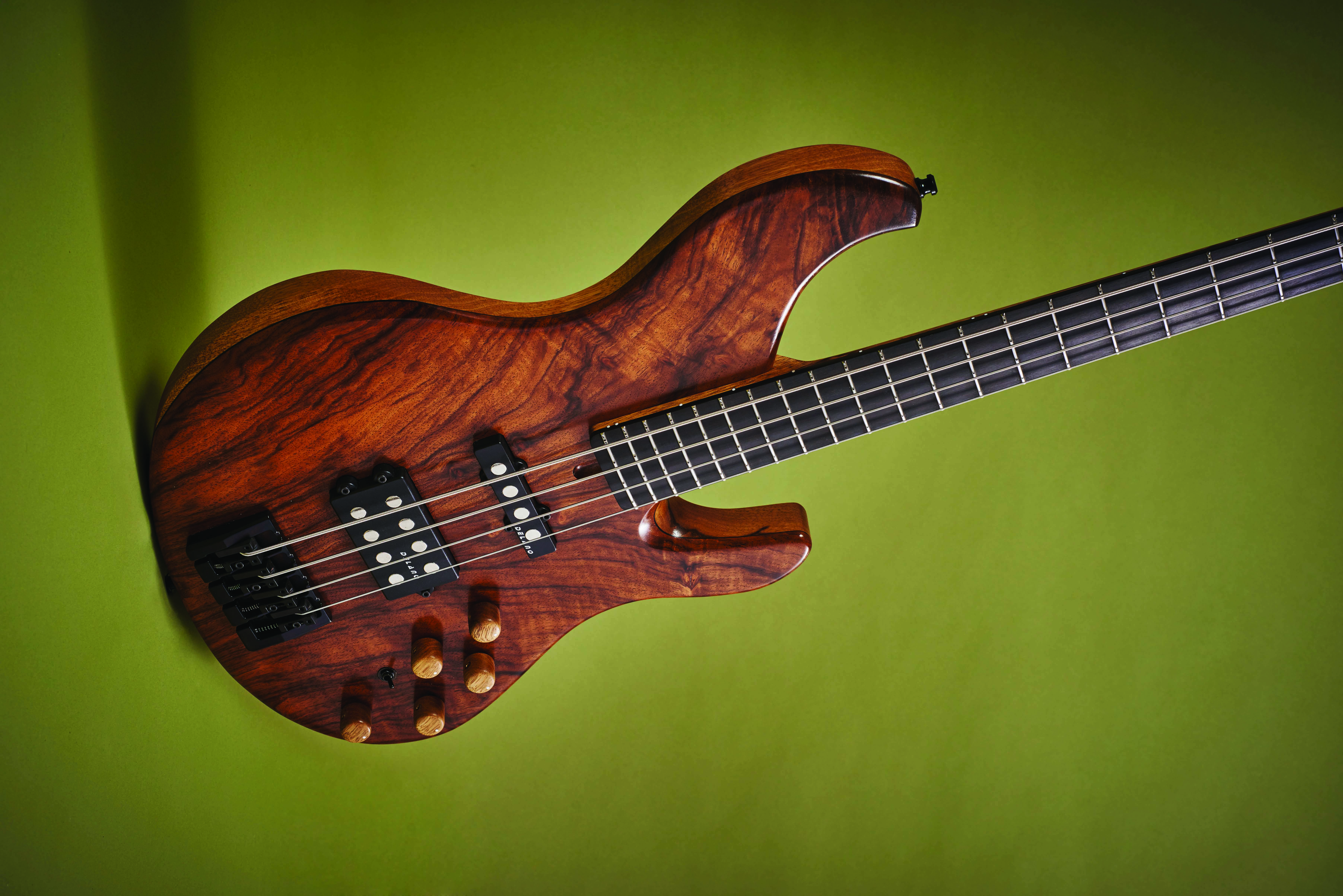MusicRadar Verdict
A fine instrument.
Pros
- +
Good looks
- +
Solid tones
- +
Attention to detail
Cons
- -
Considerable competition at this price
MusicRadar's got your back
Adam Dolan is a luthier based in the northwest of England – and judging from the initial visuals of the Proteus Legacy, eye- pleasing timbers and high-level electronics specs are definitely his forte. The Proteus’s price tag is steep, but not out of reach of many professional players – so what do you get for your money?
Build
The Proteus’s deeply rounded black korina and walnut-topped body is a joy to look at, although the extended top horn and limited cutaway limit fret access. Fortunately, its lower cutaway provides more accessibility. A thin dark wood veneer between the body core and top wood is dyed black maple, and if you like your timbers visible, the satin finish shows them off to the max. Using a five- piece korina and rosewood laminate that extends to the headstock facing, a five-bolt neck attachment ensures that the body and neck are tightly connected.
The bass balances well, with no evident headstock dive, and sits perfectly across the player’s body, despite limited body contouring to the rear. The neck profile is relatively slim, following a shallow D shape, so navigating it is extremely comfortable. The contoured neck heel improves things for those of us who like to venture around the dusty end of the 24-fret ebony fingerboard.
The level of finishing is very professional: small touches such as the use of korina for the controls are appreciated. Resplendent with black hardware, the Grainger bridge offers toploading and through-body stringing options, with a 19mm string spacing. The front facing of the fingerboard is clean, so white side dots are your main form of neck navigation: overall, the setup is very pleasing, with smooth fret edges, a friendly string action and a sleekness to the neck that makes you want to start playing.
The tones are very organic-sounding
Sounds
Before plugging in, a quick test of the instrument shows it to have a slightly dark but resonant tonal character, with plenty of sustain. The string volume is strong and consistent across all four strings, while the ebony board adds a noticeable focus to the core tone, giving each note a harder edge than you might expect from, say, a rosewood board.
Plugged in, the Delano humbucker and single coil, in tandem with the Glockenklang three-band preamp, bring the Proteus to life. The tones are very organic-sounding, so if hi-fi slap sounds are your thing, you may have to work the EQ a little. The mid-tone stands out, so use the tone options with care. Panning across both pickups, the single-coil unit offers a tight sounding neck tone, rounded but without too much flap or woolliness. Switching to the humbucker, you have a choice of switching into single-coil mode, where the variations in tone are very apparent.
The tones are broad, but I was expecting a more radical delivery from the treble control, which sounded a little tame considering that Glockenklang preamps can sound extremely bright and clinical. This one didn’t offer the expected bite, although fingerstyle and pick players will find much to enjoy with this bass. A natural punch sits in the lower-mids, giving a forceful delivery.
Want all the hottest music and gear news, reviews, deals, features and more, direct to your inbox? Sign up here.
Player comfort has been addressed, and the bass is extremely comfortable to wear, while the top bout edge is bevelled and chamfered to accommodate the player’s picking arm. The neck is a real joy to play and addresses the criteria which most players would want from a timber-laden, organic-sounding four-string.
We’re very impressed with the Proteus Legacy. It will be worth investigating if you’re looking for something different from the usual big names. It’s good to see new bass luthiers breaking through; on this evidence, Mr Dolan is a name to watch.
